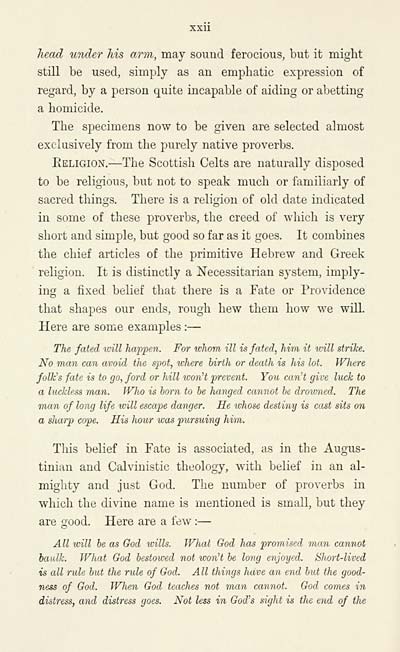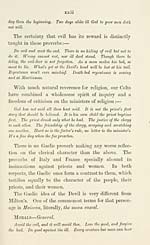Download files
Complete book:
Individual page:
Thumbnail gallery: Grid view | List view

head under Jiis arm, may sound ferocious, but it might
still be used, simply as an emphatic expression of
regard, by a person quite incapable of aiding or abetting
a homicide.
The specimens now to be given are selected almost
exclusively from the purely native proverbs.
PiELiGiox. — The Scottish Celts are naturally disposed
to be religious, but not to speak much or familiarly of
sacred things. There is a religion of old date indicated
in some of these proverbs, the creed of which is very
short and simple, but good so far as it goes. It combines
the chief articles of the primitive Hebrew and Greek
religion. It is distinctly a Necessitarian system, imply-
ing a fixed belief that there is a Fate or Providence
that shapes our ends, rough hew them how we will.
Here are some examples : —
The fated loill happen. For whom ill is fated, him it will strike.
No man can avoid the spot, where birth or death is his lot. Wliere
folk's fate is to go, ford or hill won't prevent. You can't give luck to
a luckless man. Wlio is horn to be hanged cannot be droioned. The
man of long life will escape danger. He whose destiny is cast sits on
a sharp cope. His hour was pursuing him.
This belief in Fate is associated, as in the Augus-
tinian and Calvinistic theology, with belief in an al-
mighty and just God. The number of proverbs in
which the divine name is mentioned is small, but they
are good. Here are a few : —
All will be as God wills. What God has promised man cannot
baulk. What God bestowed not won't be long enjoyed. Short-lived
is all rule but the rule of God. All things have an end but the good-
ness of God. When God teaches not man cannot. God comes in
distress, and distress goes. Not less in God's sight is the end of the
still be used, simply as an emphatic expression of
regard, by a person quite incapable of aiding or abetting
a homicide.
The specimens now to be given are selected almost
exclusively from the purely native proverbs.
PiELiGiox. — The Scottish Celts are naturally disposed
to be religious, but not to speak much or familiarly of
sacred things. There is a religion of old date indicated
in some of these proverbs, the creed of which is very
short and simple, but good so far as it goes. It combines
the chief articles of the primitive Hebrew and Greek
religion. It is distinctly a Necessitarian system, imply-
ing a fixed belief that there is a Fate or Providence
that shapes our ends, rough hew them how we will.
Here are some examples : —
The fated loill happen. For whom ill is fated, him it will strike.
No man can avoid the spot, where birth or death is his lot. Wliere
folk's fate is to go, ford or hill won't prevent. You can't give luck to
a luckless man. Wlio is horn to be hanged cannot be droioned. The
man of long life will escape danger. He whose destiny is cast sits on
a sharp cope. His hour was pursuing him.
This belief in Fate is associated, as in the Augus-
tinian and Calvinistic theology, with belief in an al-
mighty and just God. The number of proverbs in
which the divine name is mentioned is small, but they
are good. Here are a few : —
All will be as God wills. What God has promised man cannot
baulk. What God bestowed not won't be long enjoyed. Short-lived
is all rule but the rule of God. All things have an end but the good-
ness of God. When God teaches not man cannot. God comes in
distress, and distress goes. Not less in God's sight is the end of the
Set display mode to: Large image | Transcription
Images and transcriptions on this page, including medium image downloads, may be used under the Creative Commons Attribution 4.0 International Licence unless otherwise stated. ![]()
| Early Gaelic Book Collections > Blair Collection > Collection of Gaelic proverbs and familiar phrases > (26) |
|---|
| Permanent URL | https://digital.nls.uk/76277576 |
|---|
| Description | A selection of books from a collection of more than 500 titles, mostly on religious and literary topics. Also includes some material dealing with other Celtic languages and societies. Collection created towards the end of the 19th century by Lady Evelyn Stewart Murray. |
|---|
| Description | Selected items from five 'Special and Named Printed Collections'. Includes books in Gaelic and other Celtic languages, works about the Gaels, their languages, literature, culture and history. |
|---|

